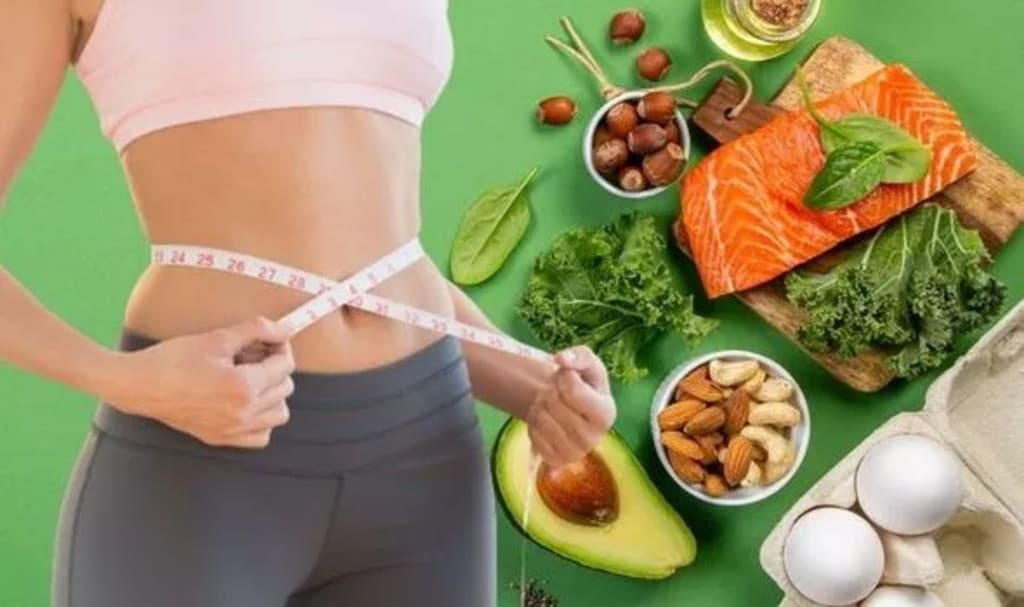Best Keto Diet for Beginners For weight loss
Read this article to learn more..

The Best Keto Diet for Beginners Who Want to Lose Weight
The Keto diet is quickly becoming one of the most popular diets for weight loss. It’s a low-carb, high-fat way of eating that has been shown to help people lose weight and improve their health. If you’re a beginner to the Keto diet and want to learn more about how to get started, this blog post will help you understand the basics and provide tips for succeeding on the Keto diet for weight loss.
1. What is a keto diet ?
A keto diet, short for ketogenic diet, is a low-carbohydrate diet that focuses on getting the majority of calories from healthy fats and proteins. The goal is to enter a state of ketosis, where the body begins to burn fat for fuel instead of carbohydrates.
When you eat a high-carbohydrate diet, your body breaks down carbs into glucose (blood sugar) and uses it for energy. With a low-carbohydrate keto diet, however, your body will switch to using stored fat for energy instead. This process is known as ketosis.
In order to achieve a state of ketosis, most people need to limit their carbohydrate intake to around 20-50 grams per day. This can be difficult to accomplish with some types of foods, so many people opt for foods that are naturally low in carbs such as meats, seafood, eggs, nuts, seeds, vegetables and certain fruits. In addition, you'll want to ensure that you are getting enough healthy fats from sources like avocados, olive oil, and coconut oil.
By limiting carbs and increasing healthy fats and proteins, the keto diet helps the body enter a state of ketosis. This can have numerous health benefits such as improved weight loss, mental clarity, and better blood sugar levels. Additionally, studies show that following a keto diet may help reduce inflammation and protect against chronic diseases. It may also lower cholesterol levels and provide protection against type 2 diabetes.
It's important to note that there are different forms of the keto diet, each with its own set of macronutrient ratios. For example, some versions may allow for more carbs than others. It's best to discuss your options with a qualified healthcare provider to determine which version is best suited for you. It's also important to make sure you're eating nutrient-dense whole foods while following the keto diet, as this will provide essential vitamins, minerals, and other nutrients needed for optimal health. Additionally, including moderate amounts of physical activity throughout your week can help boost weight loss efforts and provide other benefits such as improved cardiovascular health.
If you're just starting out on the keto diet, it's recommended to start slowly and gradually build up over time.
2. How does a keto diet help with weight loss ?
The keto diet is one of the most popular diets around and has been proven to be effective in helping people lose weight. The ketogenic diet works by forcing your body into a state of ketosis, which is where your body starts burning fat as its primary source of energy instead of carbohydrates. This process results in your body using stored fat for fuel, which can lead to significant weight loss.
The keto diet helps with weight loss by promoting fat-burning and reducing hunger. When your body is in a state of ketosis, it begins to burn fat more efficiently, which leads to rapid weight loss. Additionally, the high fat content of a keto diet can help reduce appetite and cravings, which helps prevent overeating and further contributes to weight loss.
The keto diet also helps to reduce insulin levels, which is beneficial for those who are overweight or obese. Insulin is a hormone that regulates how your body uses sugar. High levels of insulin can lead to an increase in fat storage and make it harder to lose weight. By reducing insulin levels, the keto diet can help support weight loss.
In summary, the keto diet is an effective way to help people lose weight by promoting fat-burning, reducing hunger and cravings, and reducing insulin levels. If you're looking for a way to shed some pounds and improve your overall health, then a keto diet may be the right choice for you.
3. What are the best foods to eat on a keto diet ?
The keto diet is a high-fat, low-carbohydrate diet that has been found to be effective for weight loss. To ensure you get all the necessary nutrients on the keto diet, it's important to make sure you're eating the right foods.
When it comes to the best foods for a keto diet, focus on foods that are high in healthy fats and proteins and low in carbohydrates. A few examples include:
• Eggs: High in protein and healthy fats, eggs are an excellent source of nutrition for the keto diet. You can have them boiled, poached, scrambled or fried for breakfast, lunch, or dinner.
• Meat and Fish: Rich in protein and healthy fats, meat and fish are essential components of a healthy keto diet. Choose lean cuts of beef, pork, chicken, or turkey, as well as fatty fish such as salmon, tuna, and mackerel.
• Low-Carb Vegetables: Vegetables are an important part of any healthy diet and the keto diet is no different. Low-carb vegetables such as spinach, kale, and Brussels sprouts are packed with fiber and nutrients and can help fill you up while keeping your carbohydrate count low.
• Nuts and Seeds: Nuts and seeds are a great source of healthy fats, protein, and fiber. They make an excellent snack or addition to salads and other dishes.
• Full-Fat Dairy Products: Dairy products such as cheese, cream cheese, sour cream, and Greek yogurt can add flavor and texture to meals while providing additional fat and protein.
• Avocados: Avocados are high in healthy fats and offer a creamy texture to dishes. They make a great addition to salads and sandwiches.
• Olive Oil: Rich in monounsaturated fats, olive oil is a healthy choice for cooking or dressing salads.
By focusing on these foods when following a keto diet, you can ensure you get all the essential nutrients you need while also keeping your carbohydrate intake low.
4. How do I start a keto diet ?
If you are interested in trying the keto diet, the first step is to understand the basics of what it involves. The keto diet is a low-carb, high-fat diet that is designed to force the body into a state of ketosis, where it will burn fat for energy rather than carbohydrates.
When starting a keto diet, it's important to be aware of your carb intake. This means eating very few carbs from sources such as grains, sugars, and starches. Instead, focus on eating plenty of healthy fats such as avocados, coconut oil, and nuts, as well as proteins like grass-fed beef and wild-caught fish.
In order to maintain a state of ketosis, it's also important to stay hydrated by drinking plenty of water. Additionally, some people find that supplementing their diet with exogenous ketones can help to increase their level of ketosis.
It's also important to track your macros while on the keto diet. This means counting the grams of fat, protein, and carbs you are eating each day and making sure that you are staying within your target ranges. Using a tracking app or website can make this process easier.
Finally, it's important to remember that the keto diet isn't something that you can do for a few days and then expect results. It takes time for your body to adjust to burning fat for fuel, so it's important to be consistent with your approach and be patient while you wait for results.
5. Are there any risks associated with a keto diet ?
A keto diet is a high-fat, low-carbohydrate diet that has become increasingly popular for those looking to lose weight and improve their overall health. But as with any drastic change in diet, there can be some potential risks associated with following the keto diet.
One of the most common risks is that of dehydration. The keto diet requires a lot of water to help your body process the high levels of fat and protein. If you don't drink enough water, you may experience headaches, nausea, and constipation. Make sure you are drinking enough water to keep your body hydrated.
Another risk associated with the keto diet is nutritional deficiencies. This is because the diet restricts many foods that are high in essential vitamins and minerals, such as fruits and vegetables. To avoid this, it's important to supplement your diet with multivitamins or individual supplements as needed.
Finally, there is a risk of developing kidney stones on a keto diet. While this doesn't happen to everyone, it can occur if your body isn't properly processing the minerals in the foods you are eating. To minimize this risk, make sure you are eating plenty of green leafy vegetables and increasing your water intake.
Overall, the keto diet is generally considered safe for most people if it is done correctly and under medical supervision. However, it's important to understand the risks associated with it and make sure you are taking steps to minimize them.
If you want to learn my #1 way to master the keto diet for weight loss, click here now
About the Creator
Suraj verma
Writer. More of Spiritual Person.
Follow me on IG : suraj_v10






Comments
There are no comments for this story
Be the first to respond and start the conversation.